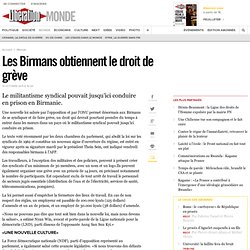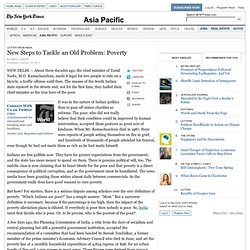

Les Birmans obtiennent le droit de grève. Une nouvelle loi saluée par l’opposition et par l’ONU permet désormais aux Birmans de se syndiquer et de faire grève, un droit qui devrait pourtant prendre du temps à entrer dans les mœurs dans un pays où le militantisme syndical pouvait jusqu’ici conduire en prison.

Le texte voté récemment par les deux chambres du parlement, qui abolit la loi sur les syndicats de 1962 et constitue un nouveau signe d’ouverture du régime, est entré en vigueur après sa signature mardi par le président Thein Sein, ont indiqué vendredi des responsables birmans à l’AFP. Les travailleurs, à l’exception des militaires et des policiers, peuvent à présent créer des syndicats d’un minimum de 30 membres, avec un nom et un logo.Ils peuvent également organiser une grève avec un préavis de 14 jours, en précisant notamment le nombre de participants. La loi permet aussi d’empêcher la fermeture des lieux de travail. «Une nouvelle culture» Mais un retour en arrière ne peut être exclu. (Source AFP) The Haqqani network: Snake country. The Quandary of India's Maoists. Army says it’s not their job Despite being overshadowed by Kashmir and continuing tension with Pakistan, dealing with Maoist rebels in central and eastern India is regarded as the country’s biggest internal security challenge, and one the military doesn’t feel it is equipped to deal with.
On the surface it seems an odd insurgency. Since dropping the so-called License Raj, India has been developing at breakneck speed, averaging nearly 7.5 percent annual gross domestic product growth since 1999 and bringing millions of formerly poverty-stricken people into the formal economy. However, in huge areas of Central and Eastern India, corruption, government inaction, rapacious mining companies and other issues have caused other millions to opt for Maoism, a political philosophy that has been abandoned by most of the world, including China, where it developed. If implemented properly, the move could be a major step towards addressing a bit of the angst that fans the Naxalite movement.
A High-Tech War Against Slights to a Centuries-Old Monarchy. Machinations behind Thai military movements. Page 1 of 2 Machinations behind Thai military movements By John Cole and Steve Sciaccitano Thailand's government released its highly anticipated annual fall military reshuffle list on October 1 after an unusual delay.

The list, which originates in the armed forces and must be approved by the prime minister and ultimately the monarch, promotes, reassigns and sometimes sidelines senior officers of the three main military services and historically has put the armed forces at loggerheads with civilian politicians. This year's delay prompted speculation that political tensions might already be developing between Prime Minister Yingluck Shinawatra's Puea Thai party-led government and the powerful military, which overthrew her elder brother Thaksin Shinawatra's administration in a 2006 coup.
Specifically, there were concerns that the delay might signify a breakdown of the terms of the In the short run, both sides can likely live with the reshuffle's results. Continued 1 2. Falling Man. ON THE MORNING OF 15 AUGUST, India’s Independence Day, it was raining cats and dogs in Delhi.

By 7 am, Prime Minister Manmohan Singh was atop the ramparts of the 17th-century Red Fort, hoisting the flag and saluting the assembled soldiers and citizens from behind a glass enclosure. Amid a sea of umbrellas, children who had gathered to watch the parade ran about, as if at a disorderly festival ground; the soldiers and paramilitary troops -paraded on the wet asphalt, completely drenched. It was an unusually gloomy Independence Day, and not merely because of the inclement weather. After his speech, Singh was driven to Congress headquarters at 24 Akbar Road for the party’s own flag hoisting ceremony.
Traditionally, the Congress party president presides over the flag raising, but with Sonia Gandhi hospitalised in the US, many predicted Rahul Gandhi would seize the moment and hoist the flag himself. “Just look at the cartoons,” the former minister continued. New Steps to Tackle an Old Problem - Poverty. It was in the nature of Indian politics then to pass off minor charities as reforms.

The poor, who did not really believe that their condition could be improved by human intervention, accepted these gestures as great acts of kindness. When Mr. Ramachandran died in 1987, there were reports of people setting themselves on fire in grief, and hundreds of thousands of people attended his funeral, even though he had not made them as rich as he had made himself. Indians are less gullible now. Laos’ Murky War on Drugs. Laos has vowed to be drug free by 2015.

But the Somsanga ‘treatment centre’ offers a glimpse into a world of abuse, beatings and suicide. By Joe Amon for The Diplomat October 12, 2011 Facebook12 Twitter0 Google+4 LinkedIn0 Today’s Laos has a communist government that institutes free market reforms and advertises itself as a haven for backpacking tourists. The government of the Lao People’s Democratic Republic says it intends to make the country ‘drug free’ by 2015, part of a regional effort by Southeast Asian countries supported by the UN Office on Drugs and Crime.